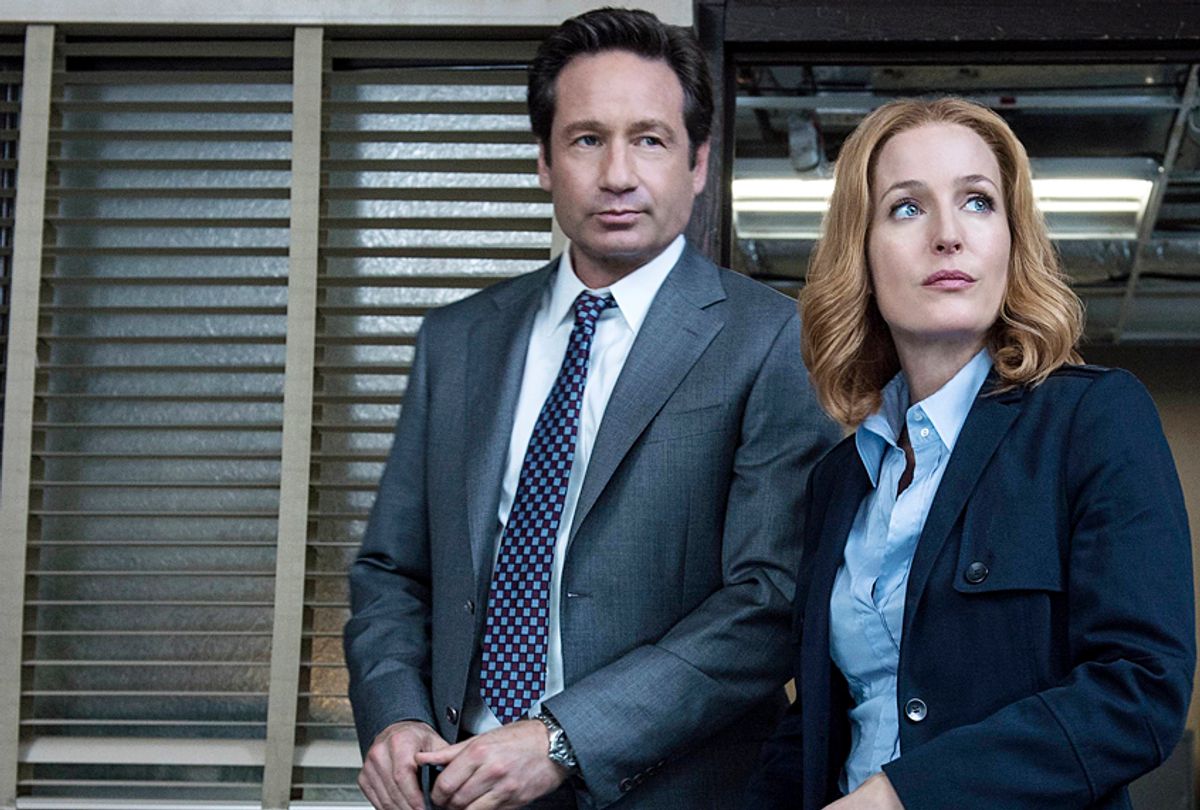Now that we’re well and deeply marinating in the post-truth era, a smidgen of a tinfoil hat fanatic exists in all of us. He’s been there all along, mind you, that little voice that spins impossible explanations and alternative facts to what we see and hear. Facts and studies be damned — what we really want, what we’ve always wanted, is to believe in the unbelievable.
Chris Carter has long played with this idea in the mythology driving “The X-Files,” a series that seemed like it would have enough content to ensure it would never run out of weirdness of explore, until it did. The presumed series finale in 2002 was a disappointing mess, as was the 2016 revival’s final episode, which lazily presented a world-ending scenario comparable to the worst episodes of “24” (As if you need reminding, bad episodes of that series were absolute stinkers by any standard).
Any presumptions that we’d seen the end of “The X-Files” were premature. Like The Cigarette Smoking Man, this series has a talent for bouncing back even after looking really, most sincerely dead. The different is that now, it is very much in its element.
The latest episodes of “The X-Files” return to Fox on Wednesday at 8 p.m., and skeptics may be surprised to discover how well it has returned to form, despite Carter’s stubborn insistence of drawing out a thread involving FBI Agent Fox Mulder’s obsession with aliens and the child he has with his partner Dana Scully.
“The X-Files” will always have its hardcore devotees, the folks who never wanted the series to go away, and who hounded Carter and the show’s stars Gillian Anderson, who plays Scully, and David Duchovny, the man behind Mulder, to continue their saga. If the show’s 2016 felt out of place, as it were, perhaps part of the reason for that is that Carter and the show’s other writers, including Glen Morgan, Darin Morgan, and James Wong, were lacking sufficient inspiration.
But these episodes were produced in 2017, a year overflowing with discussions about the manipulation of news and information and all the ways in which far-fetched falsehoods found purchase with a public hooked on echo chambers and siloed into tribes by social media. The result is a series of episodes all but intoxicated by the fears of fake news.
Actually, it’s even worse. As a villain in an upcoming episode puts is, we’re so befuddled by the deluge of “alternative facts” that he and his kind can operate in the open by dispensing “phony fake news,” which we used to know as that outdated thing called fact. “They want you think all conspiracies are nutty so that you can ignore the ones that are true,” a character insists.
He’s explaining why his story sounds crazy, but isn’t. Handily he’s also explaining our reality. These days, Mulder’s distrust of government reports and belief in cover-ups no longer makes him the outlier. Actually, we’re a lot closer to seeing the world the way he does now that we ever were before.
That may be why these new “X-Files” episodes feel sharper, tighter and smarter than the first attempt at its revival.
In the new season, Mulder and Scully accept the charge of saving the world, and part of that involves finding their child William. This thread lends a tangible purpose to the season’s standalone episode, a promise that we’ll work our way to another link in the series long-running lore. In truth, season 11 shapes up to be a parable about how little control the common person has when facing the apocalypse.
That’s always been true of this show, of course. But “The X-Files” of 2018 also peers at another horrifying reality of its doomsday scenario: that the end of the world is really mostly a problem for those of us who don’t have a part to play in its plan. You know — anyone who isn’t obscenely wealthy and powerful.
Much of our current tension is defined by the widening gap between the wealthy and everyone else, a notion this season echoes by positing that this has long been the design of a cabal of powerful beings, some of whom may not be of this Earth. And that should allow the viewer a smidgen of emotional distance as evildoers lay out their plot to destroy humanity, but we all just came through 2017, right?
Smartly, these new episodes sustain balance the show’s Rod Serling-style fictions with a paranoia, terror and humor reminiscent of “The X-Files” at its best, particularly an upcoming written by Darin Morgan, the writer behind the legendary episodes “Jose Chung’s From Outer Space” and “Clyde Bruckman’s Final Repose,” as well as the best of 2016’s batch, “Mulder & Scully Meet the Were-monster.”
The hours that expressly deal with the show’s primary mythology — including this week’s premiere, written and directed by Carter — are the weakest of the new batch. They’re also matched set; the 11th season debut, “My Struggle III,” picks up where “My Struggle II,” aka that botched 2016 season finale, left off.
Happily the leaden feel of the premiere doesn’t appear to be representative of the season as whole, which may re-earn any viewers disillusions by what recently came before. Besides, now we understand a new truth: Indulging conspiracy theories can be fun, until doing so obscures the truth so completely as to place our very existence in mortal jeopardy. It’s a scary new world, and “The X-Files” is finally getting around to welcoming us to it.



Shares